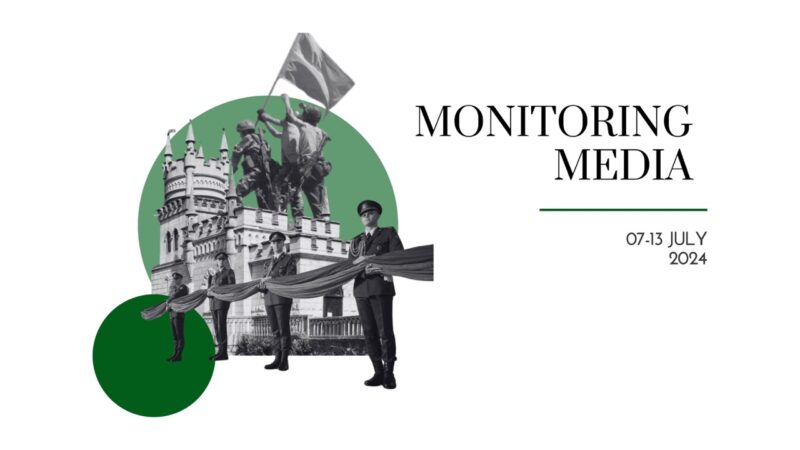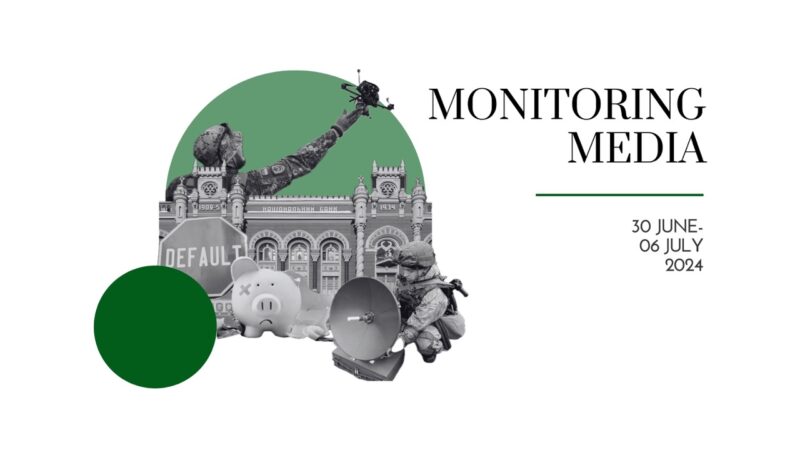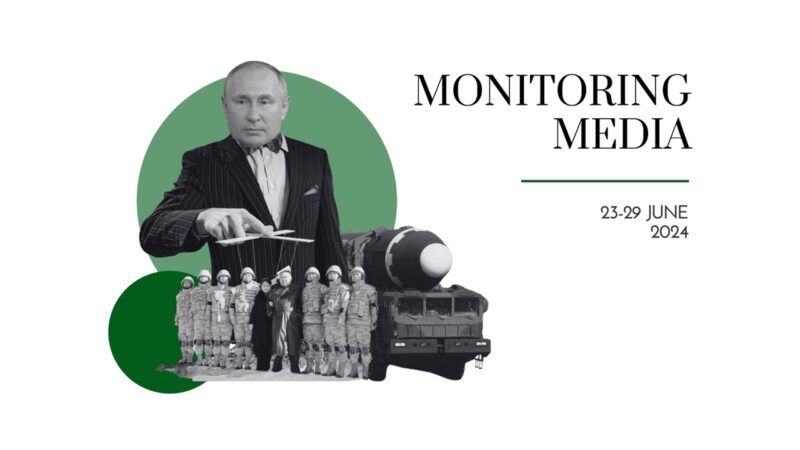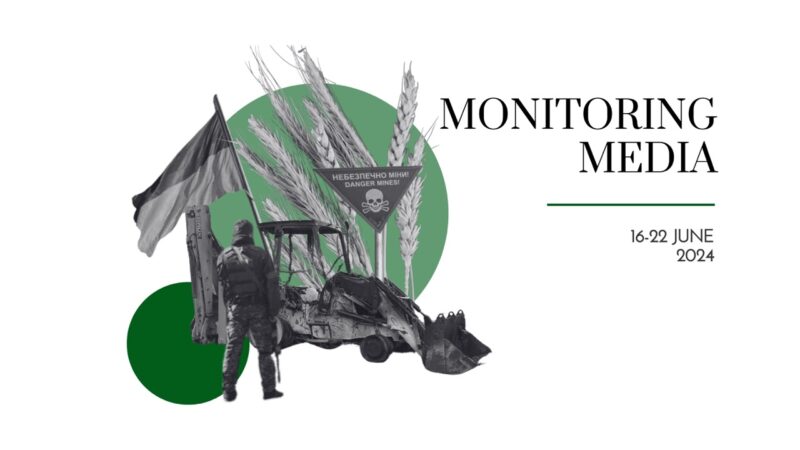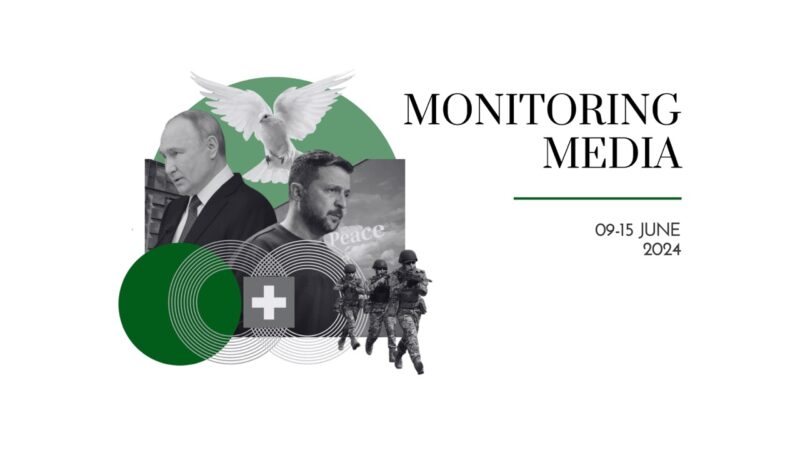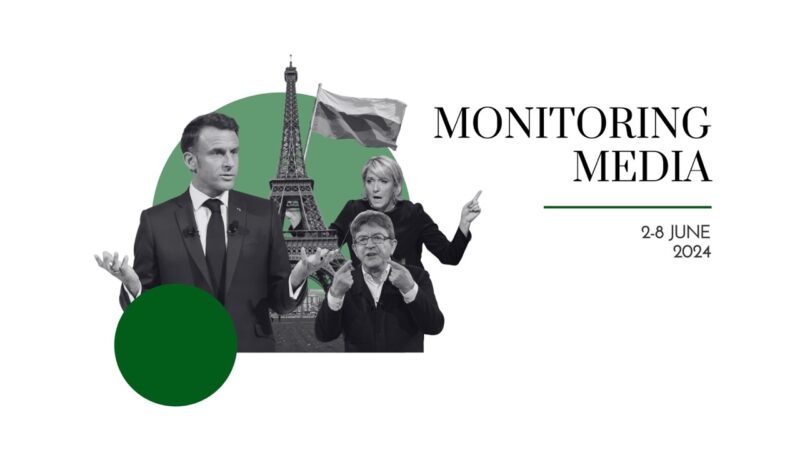As Ukraine faces a long war, critics argue the country is not ready for NATO
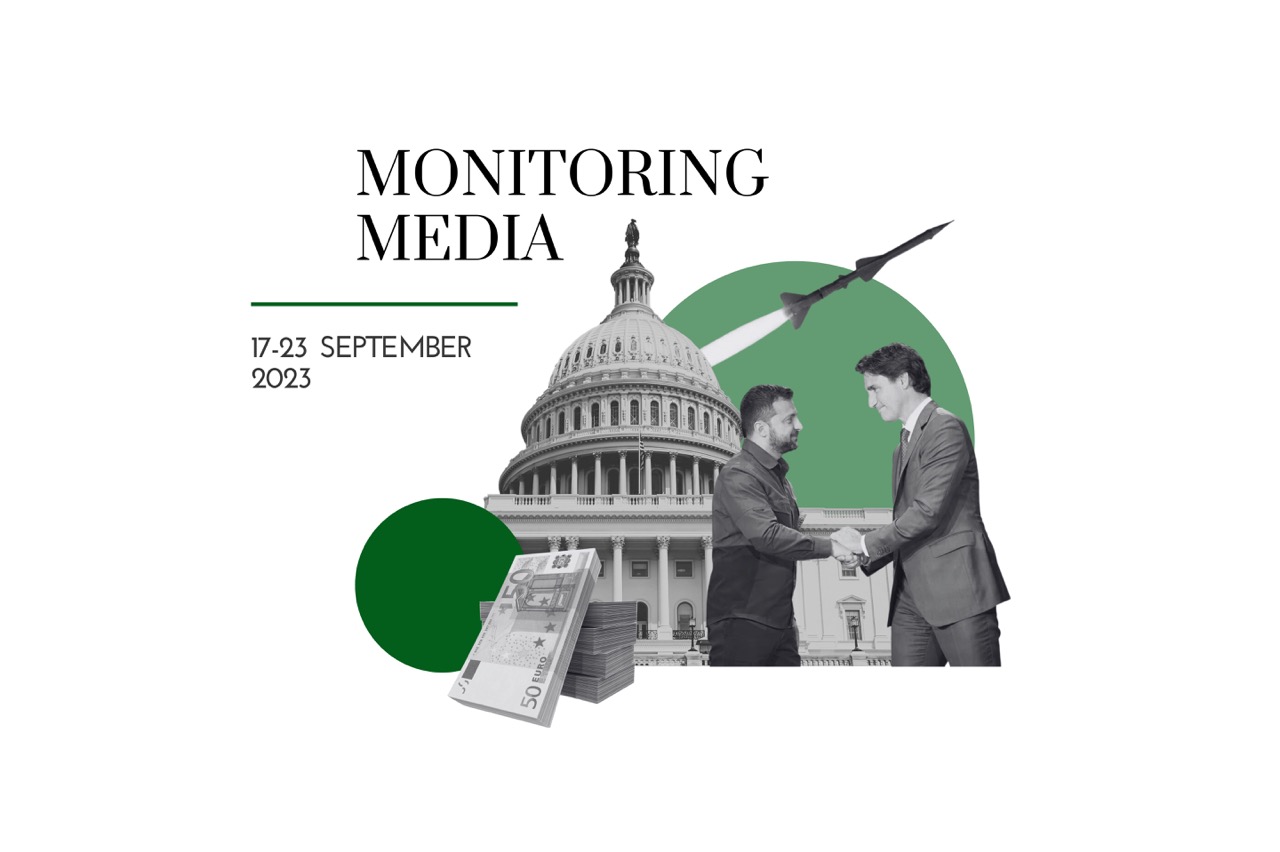
CIUS weekly report on North American media coverage of Ukrainian affairs, 17–23 September 2023
Five publications (National Review, Politico, The Globe and Mail, The Economist, and The New York Times) were selected to prepare this report on how the situation in Ukraine has been portrayed in the North American press during the past week (17–23 September 2023). The sample was compiled based on their impact on public opinion as well as on their professional reputation, popularity among the readership, and topical relevance. These five publications represent centrist viewpoints on the political spectrum.
This report covers only the most-read and relevant articles about Ukraine, as ranked by the respective North American publications themselves in the past week. Its scope covers promoted articles on home pages and articles from special sections on Ukraine, with the hashtag #Ukraine, from the paper editions of the publications, and about Ukraine from opinion columns and editorials.
Topics featured in the selected articles:
- The world and Ukraine: Ukraine is not ready to join NATO; statistics on U.S. and European assistance to Ukraine; Ukraine’s course change due to the protracted war.
- Russia at war: Transfer of frozen Russian assets to Ukraine is possible.
Main arguments:
Ukraine is not ready to join NATO. Mark Hannah (Politico) writes that the real reason why Ukraine is not ready to become an alliance member is its lack of democracy and democratic principles, which could harm NATO: “The alliance knows how to defend democracies from the outside but can’t promote democracy from within.” He notes that experts see the “war in Ukraine as ground zero of a global struggle between democracy and autocracy.” In their view, due to its resolute opposition to Russian aggression, Ukraine is worthy of joining NATO, and membership in the alliance will, in turn, “reverse the further erosion of Ukraine’s flawed democracy.” But this argument, according to Hannah, misses an important point: “NATO is designed to defend countries which are already democratic, but it’s wholly unequipped to promote democracy within those countries. Ukraine’s membership in NATO, contrary to the conventional wisdom, wouldn’t bolster the cause of Ukrainian democracy.” The NATO charter requires aspirants to support democracy, individual liberty, and the rule of law, but it cannot “prevent democratic backsliding once countries join the alliance.” In the author’s opinion, this is what happened to Turkey and Hungary. Both countries’ “slide toward authoritarianism offers a cautionary tale for Ukraine’s membership aspirations.” Hannah further opines that NATO’s task is to protect democracies from non-democratic regimes, and questions whether the alliance will be able to cope with this objective if it includes states with weak democratic foundations. He acknowledges that Ukraine has made some progress in self-cleaning and that President Volodymyr Zelensky has been more of a reformer than some of his predecessors. He has taken a tough stance on corruption, but “such a crusade is only necessary in an ailing political system—a system which, to some extent, implicates Zelensky as well.” In turn, Ukraine’s accession to NATO “in the short term [would remove] a powerful incentive for it to strengthen its democracy in the longer term: namely, the promise of (eventual) NATO membership.”
Statistics debunk prevalent myths about aid to Ukraine. Jim Geraghty (National Review) emphasizes that recent data on aid sent to Ukraine debunks the myth that European countries are lagging behind in helping Ukraine. On the contrary, Europe is more proactive in supporting Ukraine than the United States: “Europe collectively is sending $2.22 for every dollar the United States has sent.” The estimated cost of US military aid is higher than that provided by Europe, but European countries compensate with significant humanitarian and financial assistance, as well as their willingness to accept much larger numbers of refugees. According to the latest calculations by the Kiel Institute for the World Economy, it amounts to “a total of $166.92 billion in commitments by all main European donors (EU and non-EU), compared to less than $75 billion by the US.” And this is against the fact that “our Congress is still debating whether to send an additional $13 billion in military aid and $8 billion in humanitarian aid.” According to Geragthy, “Europe is reaching that threshold in part because Poland, the Baltic countries, and the Nordic countries are giving a lot more than anyone could reasonably ask. Norway, Lithuania, Estonia, Denmark, and Latvia are all contributing amounts greater than 1 percent of their national gross domestic products (GDPs).” These active states are counterbalanced by several wealthy European countries that make relatively small contributions. However, these figures do not take into account another cost item: the number of refugees accepted by these countries. The author also refutes the idea that the US does not closely monitor what is sent to Ukraine or how it is used. In June 2022 “the US government established its Ukraine Oversight Interagency Working Group.” Currently, “the federal government has more than 160 personnel from 20 US oversight organizations tracking and auditing the weapons, ammunition, equipment, and money sent to Ukraine, personnel who are primarily pulled from the Offices of Inspector General for the US Department of Defence, the US Department of State, and the US Agency for International Development.”
Ukraine faces a long war, and this necessitates a change of course. The Economist asserts that to defeat Russia, Ukraine needs to become a successful country during the war, not after it. After all, the counteroffensive that began in June, “despite heroic efforts and breaches of the Russian defences near Robotyne,” has not yet yielded significant results. Less than 0.25% of the territory occupied by Russia in June has been liberated by the Armed Forces of Ukraine. Despite the fact that Ukraine “could still make a breakthrough in the coming weeks, triggering the collapse of brittle Russian forces,” it is suggested that everyone must prepare for a protracted war. There is no reason to talk about a ceasefire or peace negotiations: “Vladimir Putin shows no sign of wanting to negotiate and, even if he did, could not be trusted to stick to a deal.” Putin needs the war to “underpin his dictatorship,” and a pause in the war is necessary to “re-arm and get ready to attack again. If Ukrainians stop fighting, they could lose their country.” Both Ukraine and its Western partners must realize that “this will be a grinding war of attrition.” However, neither Ukraine nor its Western sympathizers are ready for this. They are still fixated on the counteroffensive, but they need to rethink their military system and economic management model: “Instead of aiming to ‘win’ and then rebuild, the goal should be to ensure that Ukraine has the staying power to wage a long war—and can thrive despite it.” Such systemic rethinking will require (1) a military reset (increased mobilization efforts, increased production of drones, strikes on Russian logistics centres, etc.); (2) increasing Ukraine’s resilience (supply of artillery and heavy weapons, strengthening of air defence, training, etc.); and (3) an economic reset: “Ukraine’s economy needs to shift from relying on aid to attracting investment, even as the conflict keeps raging.” Such steps will require “political will from Ukraine but also from its friends in the West.”
Russia must pay for its aggression against Ukraine. Bret Stephens (New York Times) writes that the bifurcation point in relations with Russia has already passed, and the time has come for the transfer of frozen Russian assets to Ukraine. This would provide another source of funding “before American largess runs out.” If Congress approves the White House’s request for an additional $24 billion in aid to Ukraine, it will bring “the total amount of American aid to $135 billion, which so far has been $223 million a day since the war began, according to one calculation.” Since the beginning of Russia’s full-scale aggression against Ukraine, the US and its partners have frozen roughly $300 billion in Russian central bank assets. According to Stephens, this “money should be transferred to Ukraine, both as a matter of justice and as a deterrent against this kind of aggression.” The arguments of the party opposing such a step are flimsy. This week, the Renew Democracy Initiative presented a “184-page report” that clearly argues in favour of transferring frozen Russian assets to Ukraine. The main conclusion of the report is that the president has such opportunities, for example, earlier: “George H.W. Bush froze Iraq’s assets in the U.S. after its invasion of Kuwait, and ultimately transferred them to the United Nations Compensation Commission for victims of Saddam Hussein’s aggression.” The argument that the US could suffer long-term economic damage from the transfer of frozen assets is only partially true. If European countries, where most of Russia’s assets are frozen, take such steps simultaneously with the US, then the threat of capital flight will be minimal. “We’ve frozen Russia’s assets and declared Vladimir Putin a war criminal; it’s unthinkable that the money will ever be unfrozen except to fund Ukraine’s reconstruction. So why not get on with it now, when additional funding could hasten Ukraine’s victory, help its people as they are under fire, and send a potent message to the Kremlin and other would-be aggressors that the financial price of invasion is as countable as it is steep?”
As Ukraine’s counteroffensive continues, narratives surrounding it matter. Mark Mackinnon (Globe and Mail) argues that Russia’s prolonged and challenging war against Ukraine appears to be heading toward a stalemate. Since the Ukrainian troops liberated Kherson in late 2022, all the movement that followed “has left the front lines looking much like they did on New Year’s Day.” Both sides have suffered heavy losses, and the Ukrainian counteroffensive, though well-equipped and Western-trained, has faced difficulties due to the lack of air cover—which Mackinnon mentions multiple times throughout his text—and the heavily fortified Russian positions. Despite the slow progress, Ukrainian officials remain determined to push forward and destroy Russian fortified entrenchments, while Western observers debate the effectiveness of Ukraine’s strategy and express concerns about the potential for a winter stalemate. The author quotes Mykola Bielieskov, a research fellow at the Kyiv-based National Institute for Strategic Studies, who suggests that declaring a “stalemate” would serve Russia’s interests by pushing for peace talks that maintain its territorial gains. “There are these voices already, especially among the populist wing, who are saying, ‘Why are we investing in a stalemate?’ This is a problem that plays in Russia’s favour, unfortunately.”
Ukraine’s Western allies, including Canada, must back Kyiv until victory. In an opinion piece, the editorial board of The Globe and Mail writes that the collective West needs to recognize Ukraine’s significant contributions in resisting Russian aggression. Ukraine, led by President Volodymyr Zelensky, has demonstrated immense courage and resilience in defending its democratic principles. Despite initial doubts about Russia’s military might, Ukraine successfully repelled Russian forces, shattered the myth of Russian invincibility, and launched a counteroffensive to reclaim territory. This has made the world a more secure place by challenging authoritarian aggression. “But above all, Ukraine has demonstrated the existential importance of defying a bullying authoritarian regime that is determined to undermine the democratic West,” according to the authors. The Globe’s editorial urges the West to stand firmly with Ukraine, as its people’s courage and sacrifice serve as an inspiration for the defence of democratic values and international stability. Ultimately, victory for Ukraine is portrayed as the only acceptable outcome to repay the debt of gratitude owed to the country and to ensure a safer world. “Canada, the United States, and Europe must provide adequate and continued support to Ukraine that will keep the Russians on the run—until there is no choice for them but to return home, defeated.”
In Ottawa, Zelensky calls on Canada for continued support. Shannon Proudfoot (Globe and Mail) writes in her opinion piece how President Volodymyr Zelensky delivered a powerful speech in Ottawa on Sept. 22, emphasizing the profound connection between Canada and Ukraine while also drawing attention to a significant sculpture in Edmonton that commemorates the Holodomor, a man-made famine engineered by the Soviet government of Joseph Stalin. Zelensky highlighted that while much has changed since the monument’s unveiling (the first one in the world) in 1983, “Moscow now, as always, is bent on controlling Ukraine and makes use of all available means to do that, including genocide.” He urged Canada and the international community to recognize their shared responsibility in supporting Ukraine’s fight for survival. Zelensky’s finely crafted speeches convey the message that Ukraine’s struggle is not solely its own but a battle for global values and principles. Although “more meandering and less emotionally visceral than his other big international addresses,” according to Proudfoot, Zelensky’s speech in Canada acknowledged the vast Ukrainian diaspora and the deep ties between the two nations. It also underscored the call for assistance by emphasising that “you are us,” highlighting the importance of Canada’s support in Ukraine’s ongoing fight.
Amid a politically changed environment, Zelensky must convince Washington to choose Ukraine. Gabriel Gavin (Politico) argues that compared to his earlier hero’s welcome, President Volodymyr Zelensky is facing a more politically divided and sceptical reception in Washington during this visit. Bipartisan unity in supporting Ukraine is eroding, with some senior Republicans expressing reluctance to provide further aid. However, as Gavin points out, “the combined total of the US’s four rounds of aid to Ukraine amounts to an estimated $113 billion—a small fraction compared to total government spending that last year reached $6.27 trillion.” The author emphasises that Zelensky must address concerns about the effective use of aid and combat corruption in order to secure additional funding. In the face of shifting political dynamics, “While White House and European leaders are on his side, the Ukrainian president will have to convince those wavering in Congress that sticking with him and ensuring that Russia can’t, quite literally, get away with murder remains a worthy cause. And those in Washington will have to choose their battle,” Gavin concludes.
Zelensky criticizes the UN during the Security Council meeting, urges support for the Ukraine peace plan. Nahal Toosi, Eric Bazail-Eimil, and Mona Zhang (Politico) analyzes how President Volodymyr Zelensky and Russian Foreign Minister Sergey Lavrov both criticized the actions and abuse of the United Nations, with Zelensky urging the suspension of Russia’s veto power and Lavrov alleging selective adherence to UN principles by Western countries. Many other nations at the session also voiced frustration with the war and the UN, highlighting the global impact of the war on food supplies, energy disruptions, and nuclear security. While some called for changes to the UN system, the challenges posed by the veto power wielded by permanent members like the US, Russia, and China make significant reforms difficult to achieve. The Security Council meeting included calls for reforms and concerns about the abuse of veto power. “Several others who spoke at Wednesday’s session expressed their deep frustration with Russian actions—or inactions—at the United Nations but seemed unable to muster much beyond despair given the low likelihood of changes anytime soon at the Security Council or broader UN system,” the authors admit.
Worth your attention:
Does Ukraine really not deserve NATO membership? Mark Hannah (Politico) emphasizes that Ukraine cannot join NATO because of its weak democratic institutions and the resulting threat of further weakening the alliance: “Since the end of the Cold War, NATO has insisted that it is not an alliance arrayed against Russia but one designed to defend democracy. Admitting Ukraine while it is plagued by democratic shortcomings would further erode NATO’s reputation as a defender of democratic norms. Ultimately, it could be yet another discouraging case study in how NATO can defend democracies from without, but not from within.”
It should be noted that the hypothesis that the alliance would be weakened by Ukraine’s accession to NATO is controversial. On the contrary, Russia’s full-scale aggression against Ukraine caused public opinion in Sweden and Finland to be tilted sharply in favour of joining NATO, and both countries have applied for membership even though many years before they had hesitated over this issue. The accession of two countries to NATO has unquestionably strengthened the military alliance.
Second, the North Atlantic Treaty is an intergovernmental military alliance between 31 member states, designed to “unite their efforts for collective defence and for the preservation of peace and security.” The Alliance’s main task is to “defend its member countries and their one billion citizens. It does this by bringing together the governments and the armed forces of the 31 Allies, and by providing a security guarantee that an attack on one of them is an attack on all of them.” Accordingly, the primary task of the Alliance is to ensure the security of its member states and their citizens, and the secondary task is to implement democratic principles. The Allianceʼs ability to defend its member states and ensure peace in the region is a key factor in the credibility of this international institution.
Third, Ukraine—whose army, according to the GFP, is among the 15 strongest armies in the world as of 2023—can certainly strengthen the region’s security system and the Alliance as a whole, not weaken it.
And fourth, it is absurd to claim that leaving Ukraine outside of NATO in the face of Russian aggression is a step in favour of Ukraine itself. According to the United Nations, Russia’s full-scale invasion of Ukraine has already killed more than 9,000 civilians. The number of casualties among the Ukrainian military is a state secret, but there is no doubt that the losses are much higher. It is immoral to compare the value of human life with a potential threat to democratic principles. The mechanism that can stop this suffering is Ukraine’s membership in NATO. Membership, in turn, is the best guarantee of Ukraine’s security (and regional one) in the long term.
Another dubious claim by the author is that “Ukraine’s membership in NATO, contrary to the conventional wisdom, wouldn’t bolster the cause of Ukrainian democracy.” To support this thesis, the author cites the examples of Turkey and Hungary.
However, it is equally possible to cite the examples of France and Italy—which, as NATO members, have strengthened the capacity of their democratic institutions, etc.
Another controversial statement is that a “Swiss intelligence report observed ‘authoritarian traits’ in Zelensky as he tried to push Kyiv Mayor Vitali Klitschko out of contention for Ukraine’s presidential elections in 2024. Citing martial law, Zelensky has since cancelled the 2024 presidential election.”
Undoubtedly, the centralization of power during war can be seriously criticized, if there are serious and ample grounds for doing so. However, the claim that the presidential election in 2024 was cancelled is not true. After all, Article 19 of the Law of Ukraine “On the Legal Regime of Martial Law” explicitly prohibits holding elections at all levels under martial law: “…it is prohibited to hold elections of the President of Ukraine, as well as elections to the Verkhovna Rada of Ukraine, the Verkhovna Rada of the Autonomous Republic of Crimea and local self-government bodies.” Secondly, martial law in Ukraine was extended for 90 days by Presidential Decree of 18 August 2023. This means that martial law in Ukraine will end in the second half of November, and elections can be held in accordance with Ukrainian law if Russian aggression stops. Article 103 of the Constitution of Ukraine states, “Regular elections of the President of Ukraine shall be held on the last Sunday of March of the fifth year of the President’s term in office. In the event of early termination of the powers of the President of Ukraine, the election of the President of Ukraine shall be held within ninety days from the date of early termination of powers.” That is, if the Russian aggression stops, the presidential elections in Ukraine can take place on time.
